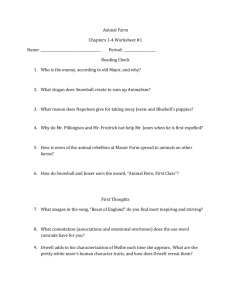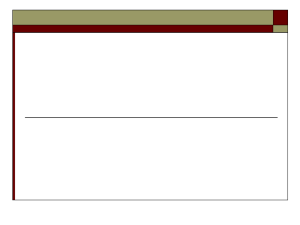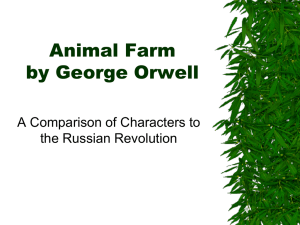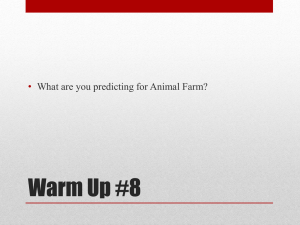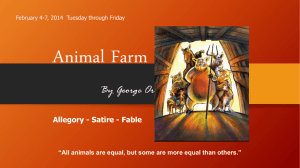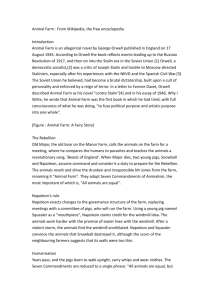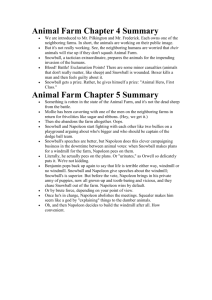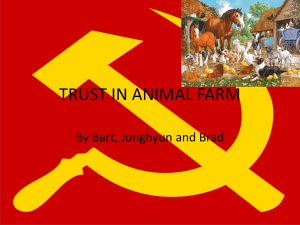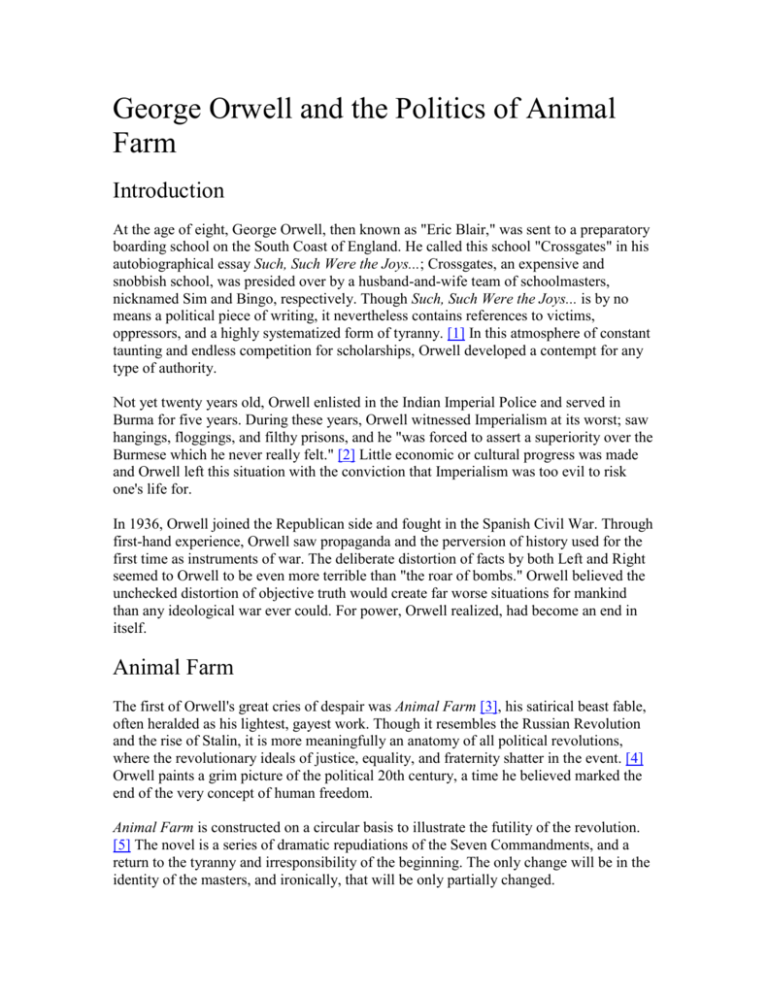
George Orwell and the Politics of Animal
Farm
Introduction
At the age of eight, George Orwell, then known as "Eric Blair," was sent to a preparatory
boarding school on the South Coast of England. He called this school "Crossgates" in his
autobiographical essay Such, Such Were the Joys...; Crossgates, an expensive and
snobbish school, was presided over by a husband-and-wife team of schoolmasters,
nicknamed Sim and Bingo, respectively. Though Such, Such Were the Joys... is by no
means a political piece of writing, it nevertheless contains references to victims,
oppressors, and a highly systematized form of tyranny. [1] In this atmosphere of constant
taunting and endless competition for scholarships, Orwell developed a contempt for any
type of authority.
Not yet twenty years old, Orwell enlisted in the Indian Imperial Police and served in
Burma for five years. During these years, Orwell witnessed Imperialism at its worst; saw
hangings, floggings, and filthy prisons, and he "was forced to assert a superiority over the
Burmese which he never really felt." [2] Little economic or cultural progress was made
and Orwell left this situation with the conviction that Imperialism was too evil to risk
one's life for.
In 1936, Orwell joined the Republican side and fought in the Spanish Civil War. Through
first-hand experience, Orwell saw propaganda and the perversion of history used for the
first time as instruments of war. The deliberate distortion of facts by both Left and Right
seemed to Orwell to be even more terrible than "the roar of bombs." Orwell believed the
unchecked distortion of objective truth would create far worse situations for mankind
than any ideological war ever could. For power, Orwell realized, had become an end in
itself.
Animal Farm
The first of Orwell's great cries of despair was Animal Farm [3], his satirical beast fable,
often heralded as his lightest, gayest work. Though it resembles the Russian Revolution
and the rise of Stalin, it is more meaningfully an anatomy of all political revolutions,
where the revolutionary ideals of justice, equality, and fraternity shatter in the event. [4]
Orwell paints a grim picture of the political 20th century, a time he believed marked the
end of the very concept of human freedom.
Animal Farm is constructed on a circular basis to illustrate the futility of the revolution.
[5] The novel is a series of dramatic repudiations of the Seven Commandments, and a
return to the tyranny and irresponsibility of the beginning. The only change will be in the
identity of the masters, and ironically, that will be only partially changed.
Animal Farm begins by introducing Mr. Jones, the master of the farm, who is too drunk
to shut the popholes in the henhouse. The owner of Manor Farm also forgets to milk the
cows, a biologically-serious omission, and is irresponsible toward the rest of his animals.
(Later yet, the pigs will also forget the milking, an ironic parallel that reveals the
subsequent corruption of the revolution.) One of the cows breaks into the store shed and
Mr. Jones and his helpers try to fight off the hungry animals. "A minute later all five of
them were in full flight down the cart track that led to the main road, with the animals
pursuing them in triumph." Then, "almost before they knew what was happening, the
Rebellion had been successfully carried through - Jones was expelled, and the Manor
Farm was theirs." Yet with the revolution secured, there are graver dangers than the
threat of invasion and counter-revolution. The ultimate corruption of the revolution is
presaged immediately:
"They raced back to the farm building to wipe out the last traces of Jones' hated reign...
the reins, the halters, the degrading nosebags, were thrown onto the rubbish fire which
was burning in the yard. So were the whips."
Their reaction is understandable, but the desciption of the inevitable and immediate
violence foreshadows the fate of the rebellion: reactionary cruelty, the search for the
scapegoat, and the perversion of the ideals of the revolution. [6]
Nevertheless, the animals are too overjoyed with their sudden success. Snowball, one of
the pig leaders (the other is Napoleon), with the assistance of Squealer, the pigs' publicrelations "man," crosses out the name "Manor Farm" and climbs a ladder and writes these
words on the end wall of the big barn:
The Seven Commandments
1.
2.
3.
4.
5.
6.
7.
Whatever goes upon two legs is an enemy.
Whatever goes upon four legs, or has wings, is a friend.
No animal shall wear clothes.
No animal shall sleep in a bed.
No animal shall drink alcohol.
No animal shall kill any other animal.
All animals are equal.
Thus the ideals of the revolution are spelled out in writing and yet these same ideals are
perverted almost immediately. With the task of harvesting the hay presenting itself to the
animals, Snowball cries, "... to the hayfield! Let us make it a point of honour to get in the
harvest more quickly than Jones and his men could do." All the animals proceed directly
to the hayfield, but the pigs, rather than working, direct and supervise the others. "With
their superior knowledge it was natural that they should assume the leadership." The pigs'
managerial role foreshadow the perversion of the Seventh Commandment.
In this period of bliss, there are brewing far more horrible situations for the animals of
Animal Farm. While Snowball is organizing "The Egg Production Committee" for the
hens and the "Clean Tails League" for the cows, Napoleon, the sinister pig tyrant, is
carefully educating a few puppies for his own evil purposes. Mr. Pilkington and Mr.
Frederick, the owners of the farms adjoining Animal Farm, spread rumors of
cannibalism, torture with red-hot horseshoes, and poligamy. On the other hand, there are
rumors of a "wonderful farm, where the human beings had been turned out and the
animals managed their own affairs" - in short, a paradise. Neither set of rumors is true for is not the social situations of conflicting ideologies that Orwell concerns himself with,
but the misrepresentation, the falsification, and the distortion of fact which leads
unfortunately to disaster and misery. [7]
The way fact is distorted and misrepresented is graphically portrayed in the rivalry
between Snowball and Napoleon over the construction of a windmill. During a meeting,
Snowball has almost swayed the animals to his side, that is, for the construction of the
windmill, when suddenly nine huge dogs, the product of Napoleon's evil efforts, chase
Snowball off the farm. Snowball becomes the scapegoat in Napoleon's plans, and
everything that comes to harm Napoleon's regime will be blamed on Snowball. The
remainder of Animal Farm is a chronicle of the consolidation of Napoleon's power
through clever politics, propaganda, and terror. On the third Sunday after Snowball's
expulsion, the animals hear that Napoleon wants the windwill to be built after all:
"The evening Squealer explained privately to the other animals that Napoleon had never
in reality been opposed to the windmill. On the contrary, it was he who had advocated it
in the beginning, and the plan which Snowball had drawn on the floor of the incubator
shed had actually been stolen from among Napoleon's papers... He had seemed to oppose
the windmill, simply as a maneuver to get rid of Snowball, who was a dangerous
character and a bad influence."
The animals are not sure of Squealer's explanation but a few of Napoleon's dogs growl so
threateningly that the animals accept it without question. This developing state of tyranny
and oppression will ultimately transform the "unalterable" Seven Commandments into
Napoleon's own laws.
The windmill soon becomes the means by which Napoleon exerts control. He uses it to
direct the animals' attention away from the growing shortages and inadequacies on the
farm, and the animals ignorantly concentrate all their efforts on building the windmill.
The symbolic nature of the windmill is itself important - it suggests an empty
concentration, a meaningless, unheroic effort, for the idea is literally misguided. [8]
It is about this time that the rest of the animals notice that the pigs have taken residence in
the farmhouse, and contrary to what they believe has been ruled against, the pigs have
begun to sleep in beds. Clover the horse is doubtful, but she reads the Fourth
Commandment on the barn wall, and concludes that she was mistaken after all: "No
animal shall sleep in a bed with sheets." Beginning with this small but significant change
in the unalterable Laws of Animalism, there will be an even greater and more profound
change - the blatant alteration of history.
Half-finished, the windmill is suddenly destroyed, at the hands, so says Napoleon, of the
traitor, Snowball. Work on the windmill resumes, this time with less rations for the
animals. Almost "sure" of Snowball's secret collaboration with some of the animals,
Napoleon calls together the entire population of the farm.
"Napoleon stood sternly surveying his audience; then he uttered a high-pitched whimper.
Immediately the dogs bounded forward, seized four of the pigs by the ear and dragged
them squealing with pain and terror, to Napoleon's feet... When they had finished their
confession, the dogs promptly tore their throats out, and in a terrible voice Napoleon
demanded whether any other animal had anything to confess."
Before long, there is a pile of corpses lying before Napoleon's feet and the air is heavy
with the smell of blood. Even so, the terror and senseless death are both shattering
experiences, but they are at least comprehensible; far more terrifying is the overt
alteration of consciousness which follows the slaughter, the blatent misrepresentation of
the past, which goes unchallenged. [9] Lacking the right words to express her thoughts
after the slaughter, Clover begins to sing Beasts of England, the patriotic song of the
Rebellion. Squealer stops her and tells her that Beasts of England is of no use anymore,
because the better society portrayed in the song has already been achieved. The irony in
this statement is almost absurd, yet the animals have failed to grasp its meaning.
Rebuilt completely, the windmill is once again destroyed, this time by Frederick and his
followers who try to retake Animal Farm, but are defeated, inflicting many casualties on
both sides. To celebrate their victory, the pigs get drunk off a case of whiskey found in
the cellar of the farmhouse. A few days later, the animals realize that they have
remembered another Commandment incorrectly. It now read: "No animal shall drink
alcohol to excess." With so little opposition to this outright alteration of fact, nothing
stands in the way of the pigs.
Boxer, the strongest and hardest-working animal, falls ill. Though the van in which the
dying Boxer is taken away has the words "Horse Slaughterer" painted on the sides,
Squealer assures the other animals that the veterinary surgeon had just recently bought it,
and did not have time to paint the old name out. Boxer, devoting his unceasing labor to
the pigs, outlives his usefulness, and is rewarded by being sent to the glue factory.
Years pass, and most of the animals involved in the Rebellion have been forgotten. The
only Commandment left on the barn wall is this:
All Animals are Equal
But some animals are more equal than others.
The name "Animal Farm" is changed back to "Manor Farm." A deputation of
neighboring farmers meet the pigs and tours the farm. Toasting each other's prosperity,
Pig and Human alike proceed to play a game of cards. Suddenly:
"Twelve voices were shouting in anger, and they were all alike. No question, now, what
had happened to the faces of the pigs. The creatures outside looked from pig to man, and
from man to pig, and from pig to man again; but already it was impossible to say which
was which."
This scene illustrates the essential horror of the human condition - there have been, are,
and always will be pigs in every society, and they will always grab for power. [10] It is
the "human nature" of the animals that defeats them. [11]
Conclusion
Animal Farm is the story of a revolution gone sour. Animalism, Communism, and
Fascism are all illusions which are used by the pigs as a means of satisfying their greed
and lust for power. As Lord Acton wrote: "Power tends to corrupt; absolute power
corrupts absolutely." So long as the animals cannot remember the past, because it is being
continually altered, they will have no control over the present and hence over the future.
Notes
1. Alex Zwerling, Orwell and the Left (New Haven: Yale University Press, 1974), p.
137.
2. George Orwell, "Such, Such, Were the Joys..." in The Orwell Reader, ed. Richard
H. Rovere (New York: Harcourt, Brace, Jovanovich, 1956), p. 439.
3. George Orwell, Animal Farm (New York: Harcourt, Brace, 1946).
4. Robert A. Lee, Orwell's Fiction (Notre Dame: University of Notre Dame Press,
1969), P. 109.
5. Ibid., p. 112.
6. Ibid., p. 113.
7. Ibid., p. 116.
8. Ibid., p. 117.
9. Ibid., p. 121.
10. Stephen J. Greenblatt, Three Modern Satirists - Waugh, Orwell, and Huxley (New
Haven: Yale University Press, 1965), p. 65.
11. Roberta Kalechofsky, George Orwell (New York: Frederick Ungar, 1973), p. 105.
Copyright © 1979, 1997 Paul Eissen. All rights reserved.
Last modified 19 December 1997 by phe@his.com
http://www.his.com/~phe/farm.html

